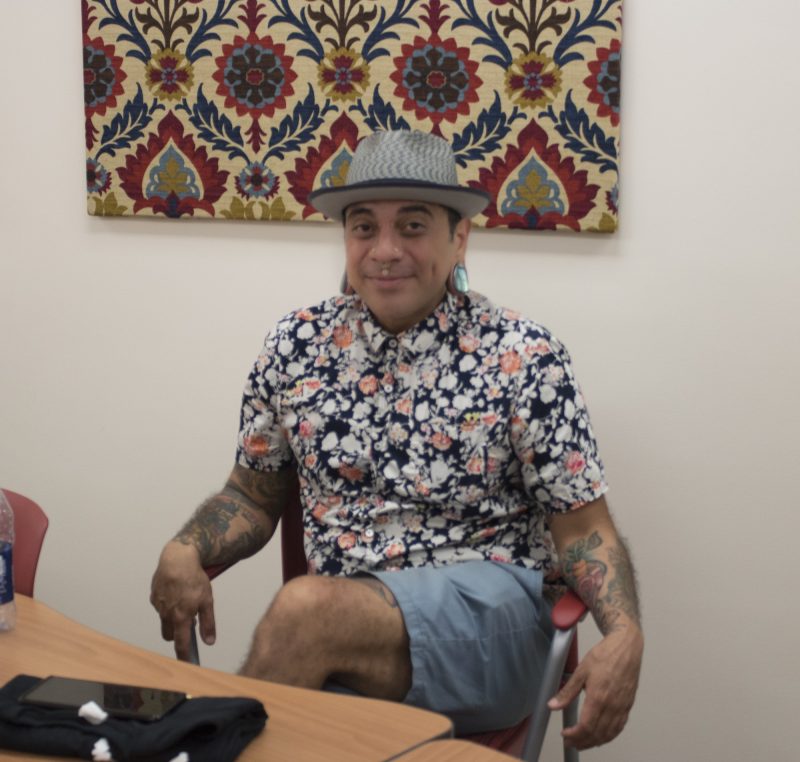Coates Library added 10 “books” to its collection last Tuesday, including: “A Christian Lesbian,” “The High Lord Double-Queer Satanist of the Kingdom of PTSD” and “Eating Disordered,” except these were human.
Trinity hosted its second annual Human Library. For 20-minute intervals throughout the evening, students spoke to a diverse range of individuals from Trinity and the wider San Antonio area and asked questions about their experiences.
Three Trinity students also participated as human human books, including first year Karen Rader, sophomore James Davis, and senior Ananda de Hoog.
The Human Library was developed in 2000 by four young people from Copenhagen. After their friend was stabbed in 1993, they wanted to do something to stop violence, so they created a forum where people could talk to “human books” from marginalized groups and learn from one another.
Jason Hardin, access service manager for Coates Library, went to a Human Library event at Incarnate Word in the spring of 2018 and decided to bring the concept to Trinity.
“It was kind of transformative for me to be able to sit with a person, face-to-face, a human being, and talk. … It takes it from being an issue, a topic, to being an actual lived experience,” Hardin said.
Hardin spoke about guidelines the Human Library organization sets for participants.
“They specify that [the book] needs to be someone who is from a stereotyped, misunderstood, marginalized or repressed group in some way,” Hardin said.
Miro Hernandez has been a professional body piercer for 18 years. As a book, Hernandez spoke about the unconventional road he took towards his current career at a local tattoo and body piercing shop in Dandyland.
Hernandez started on a pre-med track in college, then switched to speech and communications and worked for an advertising agency. But when he attended a conference and took a class on the modern rituals of the Americas, the lecturer’s words resonated with him in unexpected ways.
“[She said], ‘for those of you who do understand what you’re doing, the world also has a place for you. You are the modern day men, you are the shaman, you are the jaguar warriors, you are the spiritual healers,'” Hernandez said. “That’s when it became very clear and evident for me that this is what I’m supposed to be doing. … My path in this life is to be able to help people, and that comes with the healing in a sense that people get from body piercings.”
Hernandez loves subverting people’s expectations of what a professional piercer looks like; at the Human Library event, he wore a floral shirt, a fedora and labradorite ear gauges.
“On Saturdays, I dress up and wear three-piece suits and wingtips and bow ties to work, and you could imagine people’s faces when they walk in,” Hernandez said.
Hernandez’s stylish appearance serves him well in his field. Along with doing piercings at Dandyland, Hernandez has experience working as a consultant and trainer, traveling across the U.S. and teaching people how to tattoo and pierce safely and meeting with state legislators to help pass laws.
To gather books, Hardin reached out to local nonprofit organizations like the San Antonio Clubhouse, a nonprofit which helps people with mental illnesses or disabilities obtain support in a safe, nonclinical environment.
“Linda Williams, who works as a full-time volunteer at the Clubhouse and was another book, spoke about being on the autism spectrum. Although her presentation was tilted “The Challenges of Asperger’s Syndrome,” Williams emphasized how being autistic has also positively impacted her life.
“I might have quirks and difficulty understanding some things, but I have other things that are really positive. I’m an intelligent person, and I love to learn,” Williams said.
Williams’s neurotype and gender made aspects of her childhood difficult.
“When I was diagnosed at 12 — I’m 47 now — it was very rare for women and girls to get that diagnosis,” Williams said. “My parents did not want to accept that I was on the spectrum. With both of those things in mind, I struggled a lot in school. I had a hard time navigating relationships and friendships and understanding people’s body language.”
Williams went to college in Seattle for fine art and photography, which she characterized as a period of growth. Over time, Williams learned to accept herself fully.
“This is a part of who I am, but it doesn’t have to stop me from anything I want to do or succeed in,” Williams said.
Rita Urquijo-Ruiz, professor of modern languages and literature, shared her story about emigrating to California when she was 16, “Undocumented and Queer: a Trinity Professor’s Journey.”
“I’m hoping to humanize those two sides of the story, the immigration story and the queer story. I think that sometimes professors seem almost not accessible or that we’re like a different type of human. … I hope students are able to feel like they have an ally,” Urquijo-Ruiz said.
Urquijo-Ruiz is currently writing a memoir, and said that this event was a great opportunity for storytelling practice.
While their religious views differ, both Rader and Davis’s stories involved reconciling spiritual elements with their life circumstances. Rader spoke about growing up in a conservative area of Silicon Valley, and how family acceptance and a service trip helped her realize that her lesbian identity could coexist.
“I want people to know that … spirituality and sexuality are not mutually exclusive,” Rader said.
Junior Cat Cura attended the event and enjoyed hearing Urquijo-Ruiz’s story.
“I love [Ruiz] so much, she is a huge role model to me, so it was just awesome being able to spend quality time with her and hear her story,” Cura said.
Students interested in this event or who want to be a book next year can email [email protected].







